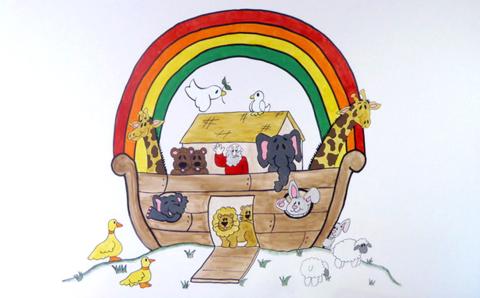Ken Lee’s journey to fulfill his calling as a missionary in Japan was unusual and challenging. Born in 1959 as Ha-Jin, Lee was the fourth son of a struggling atheistic family in South Korea, a country still recovering from the Korean War. With Ha-Jin's birth, nine people lived in their small house.
Ken’s Korean name, Ha-Jin, means “peaceful river,” but four times he almost drowned. Once, accompanying his grandmother to a river to wash clothes, Ha-Jin slipped into the river and was swept downstream, the air in his loose shirt barely keeping him afloat. His grandmother sprinted along the shore and pulled him out, sobbing as she held him close.
Ha-Jin looked up at his grandmother and asked, “Why are you crying? I’m all right.”
“I’m crying for happiness, my little peaceful river,” she replied. “You could have drowned!”
Ha-Jin and his brothers helped supply protein for the family’s diet by catching grasshoppers for snacks and frogs for supper.
At school Ha-Jin and his brothers learned about the atrocities Koreans had suffered during the Japanese occupation of Korea from 1910 until the end of World War II in 1945. During those 35 years, about 6 million Koreans were killed for refusing to worship the emperor of Japan—or for no reason at all. Ha-Jin’s grandfather fled to Manchuria to avoid death. During the occupation, the Japanese tried to make Korea a part of Japan. They banned Korean-language newspapers, and schools taught only Japanese. Koreans were not allowed to celebrate their traditional festivals.
As a result, Ha-Jin grew to hate the Japanese. “They are my enemies!” he said. “They are bad people. I will never forgive them for what they did!”
Ha-Jin’s life changed dramatically in July 1971 when he flew to the United States with his mother and one of his brothers. His father and two older brothers had gone ahead in 1970. After a long journey, they arrived in California. There Ha-Jin met aunts, uncles, and cousins and discovered that his new American name was Kenny. Ken enjoyed living in America. For the first time, he had enough food, even though it took a while to acquire a taste for new foods like hamburgers. Ken was ready for sixth grade, but entered fifth grade to improve his English.
Christian influences entered Ken’s life. Spending time at his friend Jimmy Lucas’s home, Ken observed a Christian family stopping before meals to thank God. When Ken was 16, his oldest brother married a Korean Christian, and Ken started attending church with them on Sundays. Ken was baptized there without fully understanding the meaning of baptism.
Ken’s friend John Yang invited Ken to play on the soccer team of Orange Korean Christian Reformed Church, which met at Fountain Valley Christian Reformed Church. Ken loved soccer and gladly joined the team. At the end of the season, the soccer team was recognized at a church service, leading Ken to attend services and Bible studies there.
At the church, Ken grew to understand what being a Christian means. There he also met Jeannie, who had recently arrived from Korea. Jeannie, who grew up in a Christian home, helped Ken grow in his faith and commitment. By that time, Ken had been in the U.S. for 10 years and was able to help Jeannie adjust to life in the U.S. Ken and Jeannie fell in love. Eventually they were married and had three daughters.
Ken developed a strong interest in missions and prayed for his parents to become Christians. When Christy Wilson, a former missionary and a professor at Fuller Seminary, spoke at his church, Ken told him, “I feel that God wants me to be a missionary, but I don't have a college degree.” Wilson told Ken that Fuller accepted students 35 years or older provisionally, so he could earn his divinity degree and be ordained. In 1990, Ken began his studies while he and Jeannie ran a deli. Though struggling financially, Ken refused help from his parents, wanting them to see God providing for his family’s needs.
Ken knew God wanted him to be a missionary, but didn’t know where. He led summer mission trips to Tijuana, Mexico, in 1994 and to a remote area of Thailand in 1995. On these trips the volunteers built churches, led vacation Bible school, and interacted with the people. In Thailand, volunteers’ white shirts turned brown from washing them in the muddy river water. They endured flea and mosquito bites without complaining. That was Ken’s rule.
In 1996, Ken was preparing to lead a team either to Nepal or to South America. His pastor asked him to lead a group to Japan instead.
“No, I can’t take the gospel to Japan!” Ken blurted out. “I think you know the reason. My heart is filled with hatred for the Japanese people!”
"Do one thing, Ken,” his pastor responded. “Please pray about this decision before I tell the mission board that you’re unwilling.”
Ken prayed and decided that God did want him to go. But like Jonah, who went only reluctantly to Nineveh, Ken was an unwilling missionary preparing to lead eight volunteers. In Japan, the group taught English and visited mental hospitals, a rehabilitation center, kindergarten classes, and a community center. Meanwhile, Ken still hated the Japanese. In his mind he cursed them for what they had done to the Korean people. When he saw elderly people suffering, Ken thought, “Look at you! This is what you get for doing bad things to my ancestors.” Ken complained to God: “Why did you bring me to this place? It’s so hot and humid, and I hate it!”
But God had brought Ken to Japan, unwilling missionary though he was. At a young adult retreat, Chigiri Arai approached Ken with tears in her eyes, asking to speak with him privately. “Pastor Ken,” she said, “I am sorry.”
“Sorry?” he responded. “Why?”
"I want to apologize for what my people did to your people. As a history teacher, I know about the suffering we inflicted on the people of Korea, but Pastor Ken, please come back to Japan. I am a Christian, and I know that Japan needs to learn about Jesus. We need you!”
Ken was moved by her heartfelt apology and request. He ran outside and started to cry, repenting before God for his prejudice and animosity toward the Japanese people.
Back in California, Ken prayed about where to serve. God reminded him of Arai's request, changing the heart of an unwilling missionary to a willing one. On August 15, 1999, Ken was ordained as a minister, and he and Jeannie were commissioned as full-time missionaries with Christian Reformed World Missions.
Ken had prayed for 19 years that his parents would attend church. On their first Thanksgiving in Japan, Ken called his parents, who told him they had attended church to worship God. Five years later, on Easter Day, 2004, Ken's mother and father were baptized. Eventually all of Ken’s relatives became Christians.
Ken and Jeannie continue to share the news of God’s love in Japan with the people he once hated as missionaries with Resonate Global Mission. God is using Ken to train young leaders to spread the Christian faith in Japan.
About the Author
Ruth Moblard DeYoung, a former Banner news correspondent and teacher, writes children's books. She is a member of Hope Christian Reformed Church in Oak Forest, Ill.






